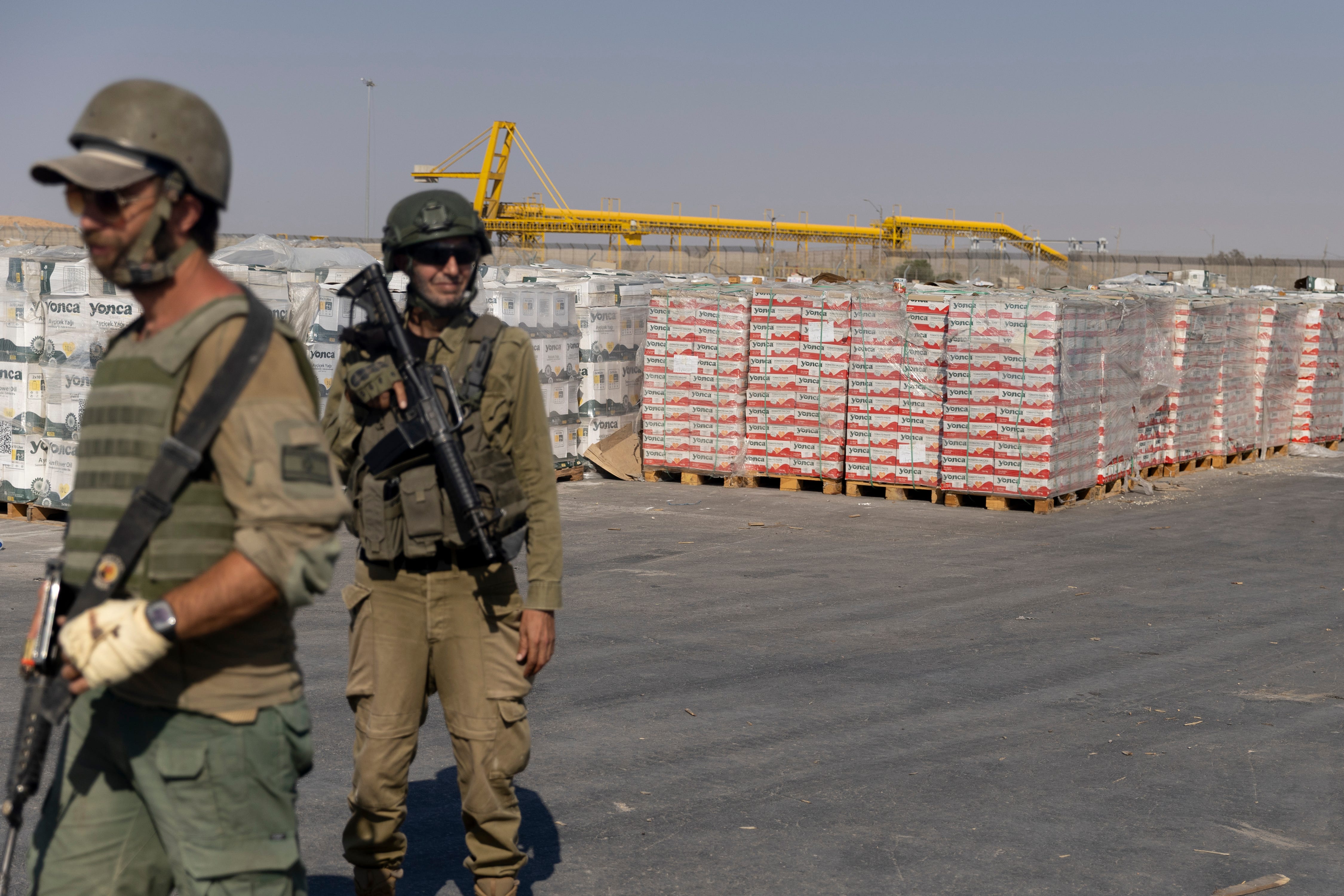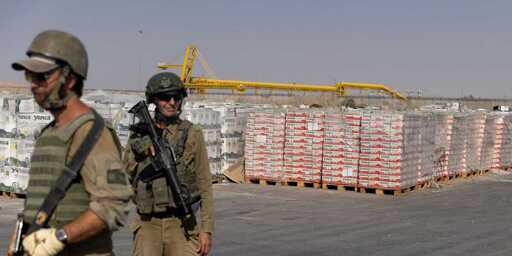The U.S. announced it was pulling out of the Gaza ceasefire talks today, even as Hamas said it remained committed to diplomacy. A senior Hamas official told Jeremy Scahill that envoy Steve Witkoff “is playing the same game of manipulation, deception and evasion” and that the withdrawal is an attempt at a “new round of blackmailing.”
In an official statement, Hamas was remarkably diplomatic:
“The Islamic Resistance Movement (Hamas) affirms that, from the outset of the negotiation process, it has acted with full national responsibility and high flexibility across various issues, and has been committed to reaching an agreement that halts the aggression and ends the suffering of our people in the Gaza Strip.
The Movement presented its final response after extensive consultations with Palestinian factions, mediators, and friendly countries, and it responded positively to all the feedback it received. This reflects a sincere commitment to the success of the mediators’ efforts and a constructive engagement with all proposed initiatives.
We are surprised by the negative statements of U.S. envoy Steve Witkoff regarding the Movement’s stance, especially when the mediators have expressed their welcome and satisfaction with this constructive and positive position, which opens the door to reaching a comprehensive agreement.
The Movement reiterates its commitment to continuing negotiations and engaging in them to help overcome obstacles and reach a permanent ceasefire agreement.”
Meanwhile, you may have seen that Israel has launched a new propaganda campaign, aiming to pin the blame for the ongoing famine in Gaza on the United Nations. If anybody in your circle is falling prey to that hasbara, please share this piece below with them.
And remember that we aim to keep our journalism free, which we can only do thanks to readers who become paying subscribers.
—Ryan Grim
 Israeli soldiers pass by humanitarian aid packages intended for the Palestinian side of the Kerem Shalom Crossing Point in the Gaza Strip on July 24, 2025 Photo by Amir Levy/Getty Images).
Israeli soldiers pass by humanitarian aid packages intended for the Palestinian side of the Kerem Shalom Crossing Point in the Gaza Strip on July 24, 2025 Photo by Amir Levy/Getty Images).
The Israeli government has pivoted to a new deflection: The famine in Gaza is not the result of Israel’s publicly announced March 2 blockade of all food entering Gaza, nor is it connected to the Israeli- and U.S.-backed Gaza Humanitarian Foundation (GHF), which replaced the UNRWA aid system Israel shut down with its own militarized version in late May. Instead, according to the new Israeli campaign, the blame lies with the United Nations. “Hundreds of aid trucks have entered Gaza with Israel’s approval, but the supplies are standing idle, undelivered,” the Israeli Ministry of Foreign Affairs declared on X. “The reason? The UN refuses to distribute the aid.”
Clearly sensing a turning-point in world opinion, as the death toll from starvation mounts exponentially in Gaza, Israel brought dozens of sympathetic journalists to a crossing to wage a PR campaign on Thursday.
Israel’s insistence that the UN must do more when it comes to aid clashed with its position in “ceasefire” negotiations. In its response submitted to mediators Thursday, Hamas insisted that any agreement must allow the UN to resume aid distribution. Israel has rejected that idea. Prior to March 2, aid was distributed through 400 non-militarized points throughout Gaza in a system coordinated by the UN. The GHF operates four points—three in the far southern end of Gaza—all in heavily militarized zones where Palestinians are shot and shelled on a daily basis as they try to access them. Even though Israel in the negotiations has been pretending to demand that the UN distribute aid, Israel has insisted that the GHF remain in control of aid distribution. Today alone, 19 Palestinians have been killed while seeking aid, according to Al Jazeera, and at least one woman was killed during a women-only distribution organized by GHF, Gaza’s medical sources told Drop Site.
Subscribe to Drop Site News.
The focal point of the Israeli accusation against the UN is a collection of some 900 aid trucks that have already crossed into Gaza but which have been unable to distribute the aid. Yet Israel has actively prevented the UN from distributing aid. Tamara Alrifai, a spokesperson for UNRWA, told Drop Site that Israeli restrictions on the movement of the organization’s staff have made distribution impossible. “Claiming that the UN isn’t picking up food and other urgent supplies, and promoting images that these goods are just sitting near the crossing is disingenuous to say the least,” she said. “Since the collapse of the ceasefire, the government of Israel tightened its already stringent restrictions even more, giving even less permission to the UN to move around the Gaza Strip.… The rule is that a UN convoy moves after getting consent. We as the UN have not been getting sufficient permission to move.”
The UN is eager to deliver aid if Israel is serious, she said. “So the ask is: let us do our work, give us movement permits, fulfill your obligation under IHL to protect our passage, then tell us whether we are fulfilling our job,” said Alrifai. “It’s truly cynical to accuse the UN of not doing its work after weeks of seeking to bypass the UN via the GHF and in reality failing to deliver through that so-called ‘humanitarian foundation.’”
At its briefing Thursday, the UN gave its most detailed explanation yet for why the aid was languishing, with Farhan Haq, deputy spokesperson for the Secretary-General of the United Nations, citing “a number of interdependent factors, including bureaucratic, logistical, administrative, and other operational obstacles imposed by Israeli authorities; ongoing hostilities and access constraints within Gaza; and incidents of criminal looting, as well as shooting incidents that have killed and injured people gathering to offload aid supplies along convoy routes.”
Last Sunday morning, a UN aid delivery was made by the World Food Programme (WFP). Head of the WFP Cindy McCain, widow of Sen. John McCain, condemned what happened next.
“Shortly after passing the final checkpoint beyond the Zikim crossing point into Gaza, the convoy encountered large crowds of civilians anxiously waiting to access desperately needed food supplies,” she said. “As the convoy approached, the surrounding crowd came under fire from Israeli tanks, snipers and other gunfire. We are deeply concerned and saddened by this tragic incident resulting in the loss of countless lives.”
The Israeli military had assured her they would not fire on aid seekers, McCain claimed, yet they did so almost immediately. “Today’s violent incident comes despite assurances from Israeli authorities that humanitarian operational conditions would improve; including that armed forces will not be present nor engage at any stage along humanitarian convoy routes,” she said. “There should never, ever, be armed groups near or on our aid convoys, as reiterated on many occasions to all parties to the conflict.”
“Without these fundamental conditions in place, we cannot continue providing life-saving support across the Gaza strip,” she said. Over 81 Palestinians were killed and hundreds wounded near the Zikim crossing that day. The incident left hundreds of trucks with aid still to be delivered, with Israel immediately beginning to roll out its campaign to deflect blame to the UN.
UN spokesperson Stéphane Dujarric called the Israeli accusation “the theater of the absurd.” He added, “I think we have seen what happens when Israeli soldiers are near a UN convoy. Right? We saw it. We saw what happened on Sunday in North Gaza. We saw the victims, and we saw the death.… Kerem Shalom is not a McDonald’s drive-thru where we just pull up and pick up what we’ve ordered. And, frankly, I think there’s a lack of willingness to allow us to do our work.”
Israel continues to reject UN requests by staff to move around Gaza, and raided the office of the World Health Organization in Deir-al-Balah this week while pressuring other UN and related organizations to evacuate. “Despite our repeated requests, Israel has not allowed the UN to be present at the crossings, which are militarized areas,” Jens Laerke, spokesman for the UN Office for the Coordination of Humanitarian Affairs (OCHA), told the AFP news agency. “We therefore cannot verify the amount of supplies currently at the crossing.”
The same day as the Sunday massacre, Israel moved to expel the head of OCHA, Jonathan Whittal, from the country, and announced it would grant only one month visas to OCHA officials.
In order for distribution to be successful, Laerke explained to AFP, “they must provide the green light for trucks without unnecessary delays; allow teams to use multiple, safer routes; and order troops to stay away from the convoys, and never shoot at civilians along the allocated routes – or anywhere else…Without the full set of conditions in place, safe and principled delivery cannot take place at scale. So even when approved, those missions are often impeded on the ground.”
During an interview on Channel 4, UNRWA Acting Director Sam Rose was asked about Israel’s claim that it had given permission to the UN to retrieve the trucks. “They are bombing central Gaza, where the vast majority of the UN’s capacity right now is situated. There’s literally no way for United Nations personnel to get out of that area. So no, it isn’t true. It isn’t true at all,” he said.
Despite the incoherence of the Israeli arguments, the U.S. stepped in Thursday to elevate them. “This is important for the world to see,” said U.S. ambassador to Israel Mike Huckabee, sharing the Israeli footage of aid at the crossing. “The UN has criticized the US & Israel for the food actually delivered, but it’s the UN who has had massive amounts sitting on pallets rotting! Let’s hope the press will tell the truth about the UN.”
State Department spokesperson Tammy Bruce, apparently the last one to get the memo that the famine is now being acknowledged and pinned on the UN rather than denied, put forward a wildly different assessment at her briefing this week, telling reporters that the work GHF was doing has been “a tremendous success.”
“GHF did it differently, and the different approach has worked,” said Bruce.
Meanwhile, international pressure on Israel continues to build momentum. 28 countries, including major European powers like France and England, issued a joint statement on Monday, saying “the Israeli government to immediately lift restrictions on the flow of aid and to urgently enable the UN and humanitarian NGOs to do their life saving work safely and effectively.” Likewise, four of the world’s largest media institutions—AP, AFP, BBC News, and Reuters—declared “We are desperately concerned for our journalists in Gaza, who are increasingly unable to feed themselves and their families." Increasingly, Israel’s supporters are facing international scrutiny.
The Israeli government’s defiant new PR campaign comes, however, as supporters of Israel are finally acknowledging that the situation has become desperate, and has created a major problem for Israel on the world stage. “It’s actually real and beginning now in a desperate way and the Israelis had better not allow it and massively uptick aid in a huge strategic way,” Israeli journalist Haviv Rettig Gur said on a podcast hosted by The Free Press, a pro-Israel news outlet in the United States. Rettig Gur cited a new paper by Yannay Spitzer, an assistant professor at the Hebrew University of Jerusalem, who studied prices of food in the markets in Deir-al-Balah, finding that they have exploded to catastrophic levels.
Amit Segal, another outspoken defender of Israel, cited the same report in raising a similar alarm, warning that a famine “would see Israel lose even its most strident supporters.”
This report includes contributions from Herman Gill.
From Drop Site News via this RSS feed


